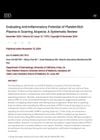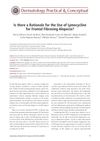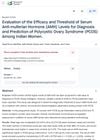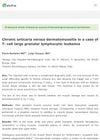210 citations,
May 2006 in “The FASEB journal” Oxidative stress causes hair to gray by damaging and killing pigment cells.
1 citations,
September 2019 in “Journal of Investigative Dermatology” Anti-Desmocollin 3 antibodies can cause pemphigus-like symptoms in mice.
 28 citations,
March 2017 in “Scientific Reports”
28 citations,
March 2017 in “Scientific Reports” Minoxidil may protect nerves and improve hair quality during paclitaxel treatment.
 50 citations,
February 2022 in “Nanomaterials”
50 citations,
February 2022 in “Nanomaterials” Nanomaterials show promise in improving wound healing but require more research on their potential toxicity.
 4 citations,
May 2022 in “BMC Women's Health”
4 citations,
May 2022 in “BMC Women's Health” High levels of anti-Müllerian hormone can indicate polycystic ovarian syndrome in women who can have babies.
 1 citations,
March 2021 in “The Journal of Sexual Medicine”
1 citations,
March 2021 in “The Journal of Sexual Medicine” The letter suggests testosterone replacement therapy might worsen COVID-19 outcomes.
 April 2022 in “Brazilian Medical Students”
April 2022 in “Brazilian Medical Students” People with androgenetic alopecia may have a higher risk of severe COVID-19.

Seborrheic dermatitis and dandruff are often treated with antifungal and anti-inflammatory medications, which can reduce symptoms and yeast growth on the scalp.
 November 2024 in “Journal of Drugs in Dermatology”
November 2024 in “Journal of Drugs in Dermatology” PRP shows promise for scarring alopecia but needs more research before replacing current treatments.
 February 2022 in “Research Square (Research Square)”
February 2022 in “Research Square (Research Square)” High levels of Anti-Müllerian Hormone (AMH) in the blood can strongly predict Polycystic Ovarian Syndrome (PCOS) and related issues in women of reproductive age.
 2 citations,
February 2014 in “Hair therapy & transplantation”
2 citations,
February 2014 in “Hair therapy & transplantation” Alopecia Areata is an autoimmune condition causing hair loss, influenced by genetics, environment, and possibly improved by anti-MIF therapy, with many patients experiencing regrowth within a year.
 January 2024 in “Dermatology practical & conceptual”
January 2024 in “Dermatology practical & conceptual” Lymecycline may help with Frontal Fibrosing Alopecia but needs more research.
 January 2022 in “Research Square (Research Square)”
January 2022 in “Research Square (Research Square)” Serum AMH levels are a strong marker for diagnosing PCOS in Indian women.
 7 citations,
January 2022 in “Plants”
7 citations,
January 2022 in “Plants” Rice husk and bran extracts from the Bue Bang 3 CMU variety can potentially treat hair loss due to their antioxidant, anti-inflammatory, and anti-androgenic properties.
 May 2012 in “CRC Press eBooks”
May 2012 in “CRC Press eBooks” Some patients on anti-TNF drugs experience a type of hair loss called TAIAPA.
 2 citations,
March 2005 in “International Journal of Cosmetic Science”
2 citations,
March 2005 in “International Journal of Cosmetic Science” Human hair structure varies by ethnicity, and certain treatments can improve hair condition and appearance.
 3 citations,
June 2023 in “Journal of cosmetic dermatology”
3 citations,
June 2023 in “Journal of cosmetic dermatology” The gel with CBD and EPA reduced wrinkles, improved skin hydration and elasticity, and had strong anti-aging effects.
 6 citations,
December 2020 in “Dermatological reviews”
6 citations,
December 2020 in “Dermatological reviews” COVID-19 may worsen with androgens; anti-androgen drugs could help.
 5 citations,
October 2021 in “Journal of Ovarian Research”
5 citations,
October 2021 in “Journal of Ovarian Research” Cinnamon can help manage symptoms of polycystic ovary syndrome, improve menstrual cycles and fertility, and positively affect cholesterol and blood sugar levels, but more research is needed to confirm these effects and find the best dosage.
 36 citations,
October 2021 in “Frontiers in Endocrinology”
36 citations,
October 2021 in “Frontiers in Endocrinology” Insulin resistance and high male hormone levels are major causes of Polycystic Ovary Syndrome.
 September 2021 in “Physiology News”
September 2021 in “Physiology News” Conditions affecting sex development show that sexual diversity is a natural part of human variation.
 January 2021 in “American journal of dermatological research and reviews”
January 2021 in “American journal of dermatological research and reviews” The muscle damage was caused by T-cell large granular lymphocytic leukemia, not dermatomyositis.
 13 citations,
August 2018 in “Journal of Molecular and Cellular Cardiology”
13 citations,
August 2018 in “Journal of Molecular and Cellular Cardiology” Finasteride improves heart function and repairs damage after heart attack in mice.
March 2023 in “Current Pharmaceutical Design” Spironolactone is effective for idiopathic hirsutism but has limited effects on other PCOS symptoms.
 28 citations,
November 2014 in “Current Diabetes Reports”
28 citations,
November 2014 in “Current Diabetes Reports” Girls with PCOS during adolescence have a higher risk of developing type 2 diabetes, and early treatment can help manage this risk.
 9 citations,
July 2021 in “Essays in Biochemistry”
9 citations,
July 2021 in “Essays in Biochemistry” Sex hormones may influence COVID-19 severity, with males at higher risk, and certain hormone therapies could potentially treat the virus.
September 1978 in “Journal of steroid biochemistry/Journal of Steroid Biochemistry”  April 2023 in “Journal of dermatological treatment”
April 2023 in “Journal of dermatological treatment” Ixekizumab successfully treated a rare hair loss condition, leading to complete hair regrowth.
 8 citations,
April 2019 in “International journal of scientific research in biological science”
8 citations,
April 2019 in “International journal of scientific research in biological science” Tridax procumbens is a widely used medicinal plant with many health benefits.
 November 2021 in “Research Outreach”
November 2021 in “Research Outreach” Low testosterone levels may lead to more severe COVID-19 outcomes.

























